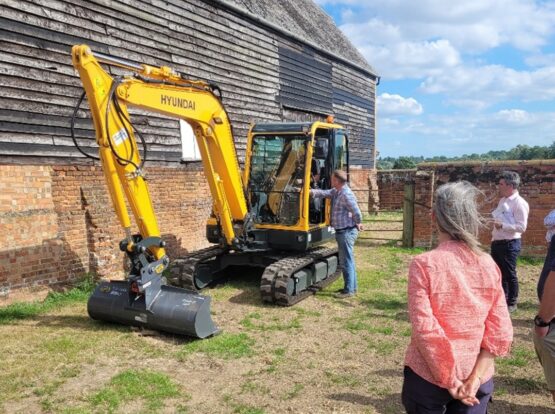Farming in Protected Landscapes Case Study:
Wetland Management – Tendring Hall Estate

For Year 1 of the Farming in Protected Landscapes programme, £33,600 was awarded to The Tendring Hall Estate, a member of the Stour Valley Farmer Cluster (SVFC) to purchase a 6 tonne 360 Hyundai digger.
This equipment is for ditch management & restoration, wetland creation and water management across the floodplains and grazing marshes of the Stour Valley cluster farms.
Objectives
The management of the ditch network across the priority habitat of the estate’s floodplain grazing marshes can be problematic due to frequent and irregular flooding, which limits opportunities for access by external contractors, which may have to be booked weeks in advance. The timing and frequency of flooding has become increasingly unpredictable as weather patterns change and heavy rainfall events increase.
The new mechanical digger will be always available so that when windows of opportunity, in terms of ground conditions and weather, present themselves, it can be deployed immediately for ditch restoration and management in line with the farm’s plans and rotas.
In addition to water management, a key focus of the project is to create and maintain a more diverse range of ditch and bankside habitats than are currently present, through rotational management and restoration of the ditches. A baseline botanical and aquatic invertebrate survey is being carried out, with further biannual surveys which will assess the impact of work undertaken and its associated biodiversity gain, and to inform further phases of management. Importantly, as a member of the SVFC,
Tendring Estate has committed to making the digger available to other members of the farm cluster on a cost-basis (rather than at market rates) for similar purposes. Ditches are an important habitat as they can support a great deal of aquatic wildlife, wetland plants and insects such as water beetles, dragonflies and
hoverflies.
Larger ditches can also be valuable for amphibians such as frogs and newts and small mammals such as water shrews and voles. Banksides can support a wide range of vegetation, from specialist aquatic species to grassland wildflower species.
Learning
In July 2022, 18 farmers and others interested in conservation met at Tendring Estate to learn about the work being done on the wetlands. The group walked the fields and the following is a short extract from a talk given by Fiona Wells, CEnv MCIEEM, Stour Valley Farmer Cluster Facilitator:
“So we are now on the marshes to show what is going to come in maintaining and restoring the ditch systems, enhancing them to create additional habitat throughout the marshes. Looking at these ditches, ditches are like ponds; natural succession occurs if you walk away from it and leave it, over time it will begin to get very full of vegetation and in particular wildlife.”
Fiona explained that rare wildlife and plant life will reappear, they just need the right opportunities to live and grow.
“So what we are doing here in Tendring is to follow our ditch management plan to define what we have got which is of particular value and importance, what is particularly sensitive and what we have to be careful of, for example things like water vole which are a protected species.”
Returning to the barn, the group had a question and answer session on the project, and were also given information on the Stour Valley Farmer Cluster and some of the challenges currently facing farmers, including climate change. Fiona explained that the lack of rainfall is an issue for the farm; however, the more pressing climate change issue is the erratic nature of rainfall where long periods of drought are followed by intense rain, often causing flash flooding.
The importance of Tendring Estate and other farm members of the SVFC having access to a digger when it is needed, rather than trying to hire one, was highlighted.
